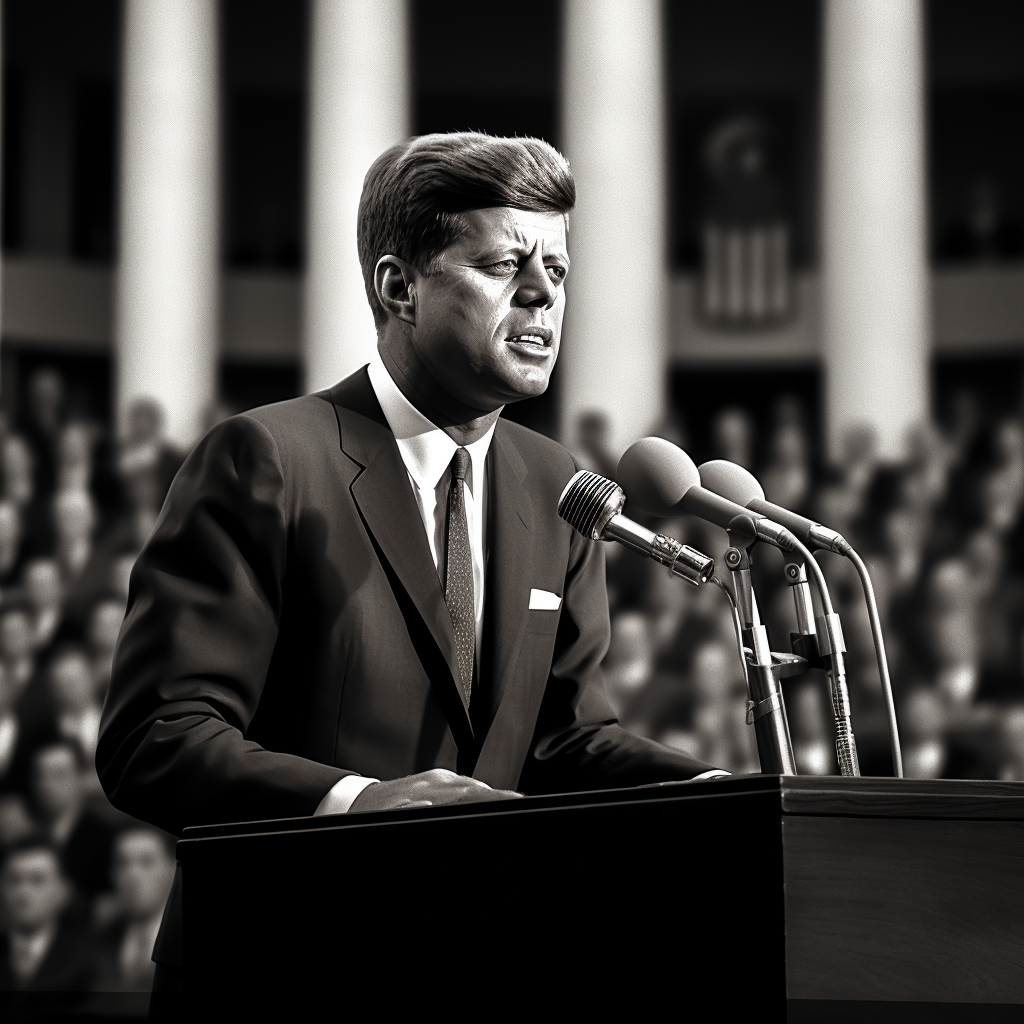
CLAIM #10:
The John F. Kennedy ‘President and the Press’ Speech on April 27th 1961, was referring to Freemasonry when he talked about ‘Secret Societies’.
ANSWER:
This claim is False !
Kennedy was NOT referring to Freemasonry at all. See below explanation for details.
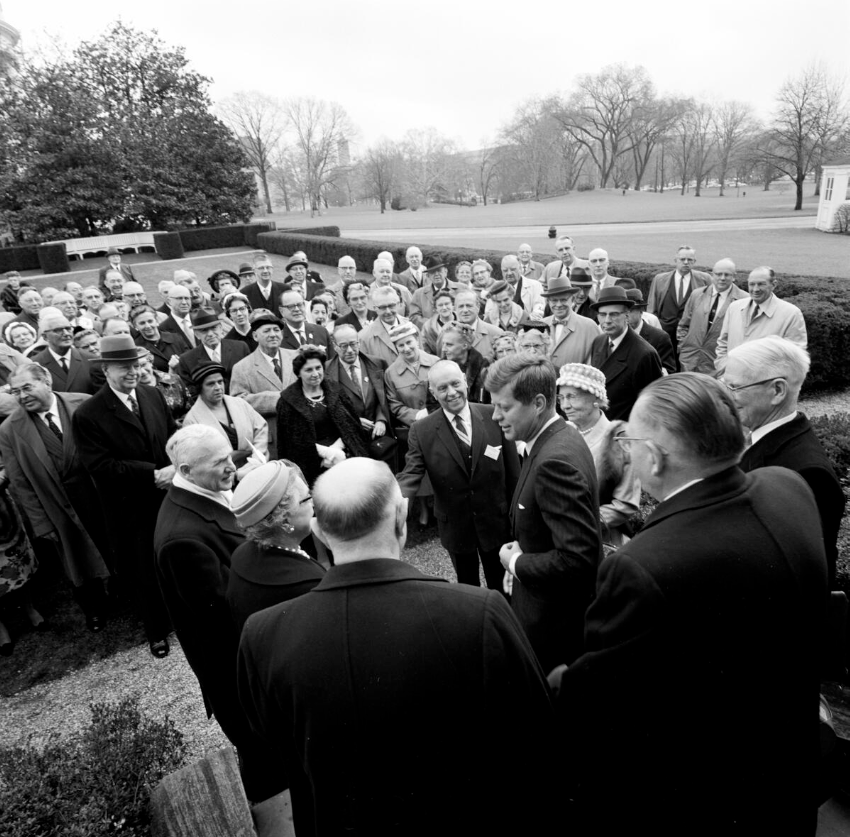
John F. Kennedy’s reference to ‘secret societies’ in his speech on April 27, 1961, was in the context of the Cold War and the need for an informed and free press. The speech, primarily addressed to the American Newspaper Publishers Association, focused on the challenges of maintaining national security and the importance of the media’s role in a democratic society.
Kennedy’s use of the term ‘secret societies’ was not directly referring to organizations like Freemasonry. Instead, he was discussing the need for secrecy in government activities, particularly in the context of countering the global communist threat. His speech emphasized the tension between the government’s need to keep certain information secret for national security purposes and the press’s role in informing the public.
The speech is often misinterpreted or taken out of context, particularly with regards to conspiracy theories. Kennedy was not condemning organizations like Freemasonry or other benign secret societies. He was addressing the delicate balance of secrecy in government affairs, especially in areas concerning national security and intelligence, against the backdrop of the intense geopolitical climate of the Cold War.
Thus, Kennedy’s remarks on ‘secret societies’ should be understood within this specific historical and political framework, rather than as a general condemnation of all secretive organizations.
Image Source:
https://www.jfklibrary.org/asset-viewer/archives/jfkwhp-1961-04-10-b#?image_identifier=JFKWHP-ST-74-2-61
More Images below during the visit of a Masonic group
with President John F. Kennedy in 1961
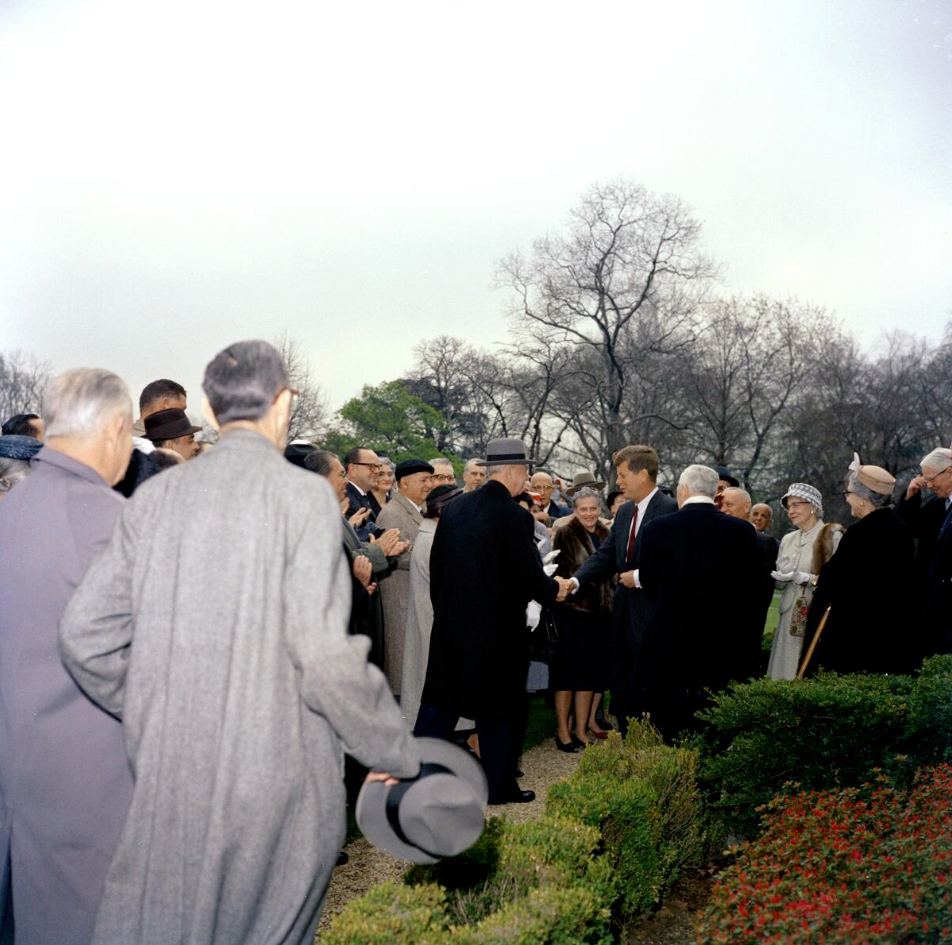
JFKWHP-KN-C17478
https://www.jfklibrary.org/
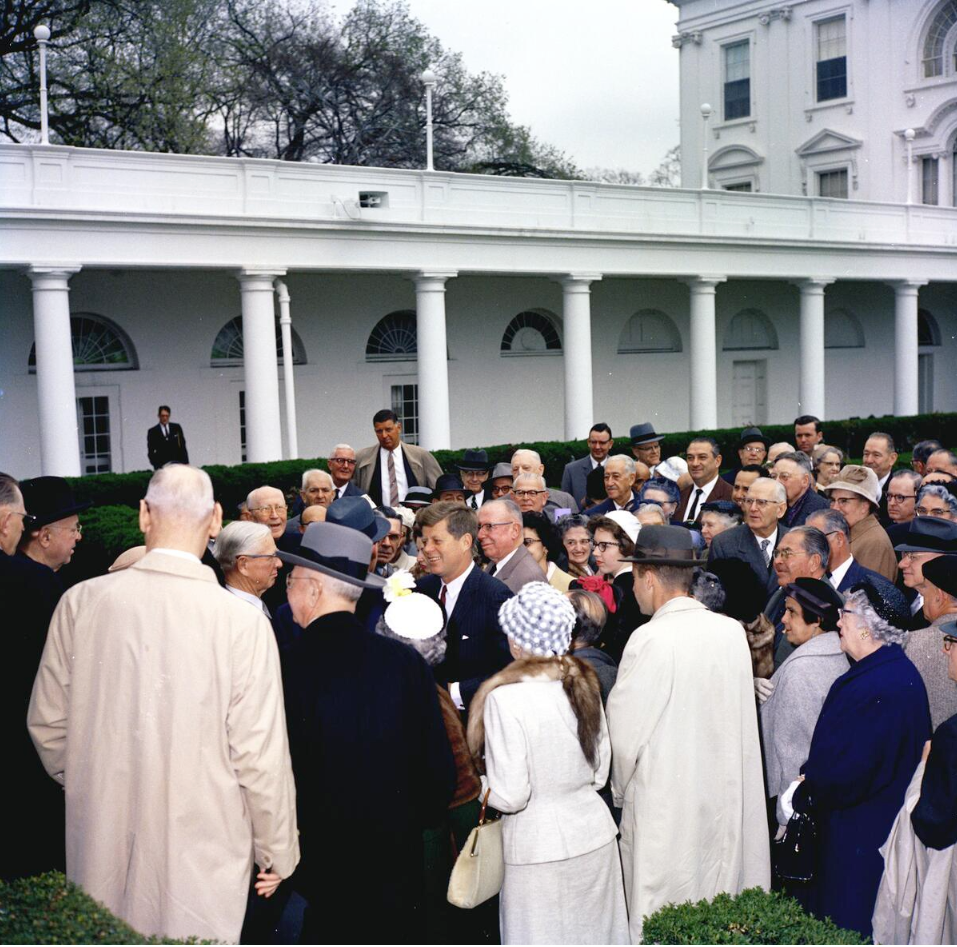
JFKWHP-KN-C17481
https://www.jfklibrary.org/
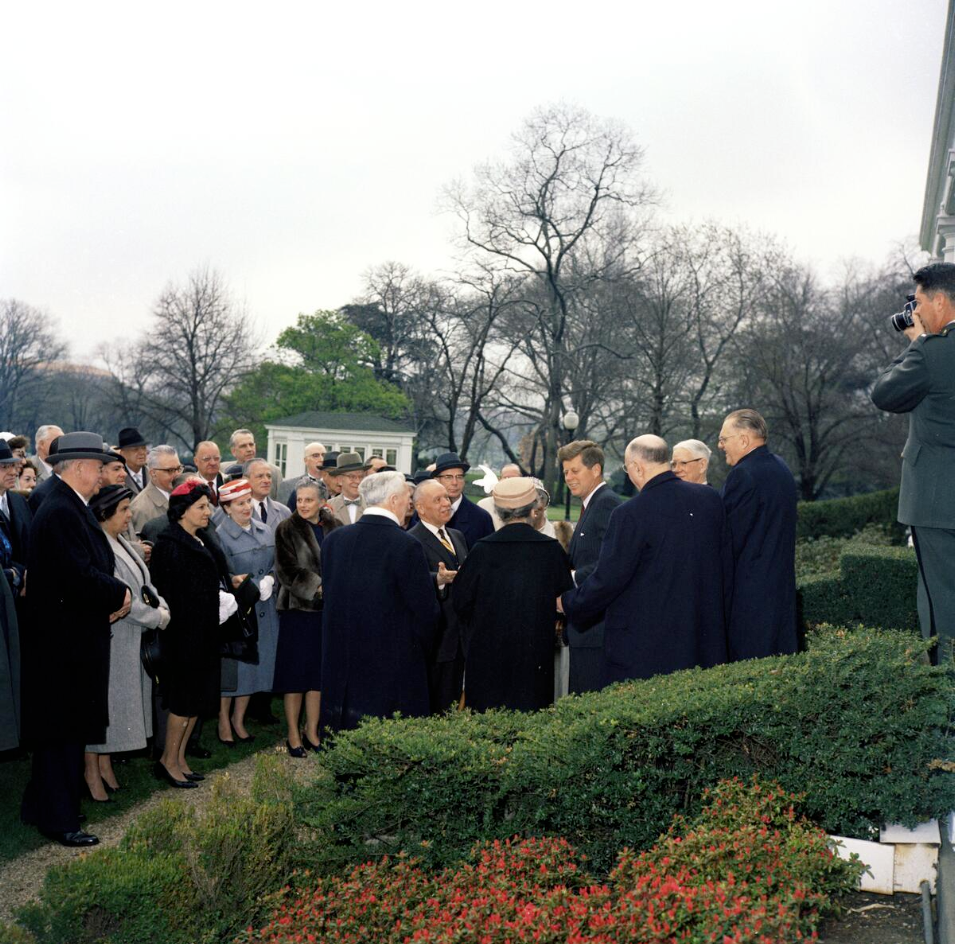
JFKWHP-KN-C17483
https://www.jfklibrary.org/

JFKWHP-KN-C17479
https://www.jfklibrary.org/
John F. Kennedy’s Masonic Visit – In Context:
In April 1961, President John F. Kennedy visited the George Washington Masonic National Memorial located in Alexandria, Virginia. This event is often noted in discussions about Kennedy’s relationship with Freemasonry and his broader historical connections.
The George Washington Masonic National Memorial is a significant site for Freemasons in the United States, dedicated to the memory of George Washington, a well-known Freemason. Kennedy’s visit to this memorial was primarily an act of homage to Washington and a recognition of his role in American history, rather than an endorsement or involvement with Freemasonry itself.
John F. Kennedy was not a Freemason, and his visit to the memorial should be viewed within the context of his presidential duties, which often included attending events and locations of historical importance. The visit was more about acknowledging the contributions of George Washington as a founding father of the United States and less about Freemasonry as an organization.
The event is sometimes brought up in discussions about Kennedy’s alleged comments on ‘secret societies’ in his April 1961 speech to the American Newspaper Publishers Association. However, it’s important to distinguish between his official activities as President, which included visits to historical sites and memorials, and his policy positions or personal beliefs, as articulated in his speeches and other public statements.
Thus, President Kennedy’s April 1961 visit to the George Washington Masonic National Memorial was a presidential gesture of respect towards George Washington and American history, rather than an indication of Kennedy’s personal involvement with or stance on Freemasonry.
John F. Kennedy’s “President and the Press” Speech: Context and Analysis
On April 27, 1961, President John F. Kennedy addressed the American Newspaper Publishers Association at the Waldorf-Astoria Hotel in New York City. This speech, colloquially known as the “President and the Press” speech, is often cited in discussions about secret societies, largely due to a specific portion where Kennedy uses the term “repugnant” in relation to secrecy. However, to fully understand the speech’s context and intent, it is essential to consider the broader geopolitical climate of the time, Kennedy’s relationship with the press, and the specific challenges he faced as President.
The Cold War Context:
In 1961, the world was deep into the Cold War, a period of intense geopolitical tension between the United States and the Soviet Union. This era was marked by a constant threat of nuclear war, espionage, and the spread of communism. The failed Bay of Pigs Invasion had just occurred earlier that month, a significant setback for the Kennedy administration and a point of embarrassment in the international arena.
The Role of the Press:
Kennedy’s speech primarily focused on the role of the press in a free society, particularly within the context of national security. He acknowledged the necessity of a free and independent press, stating:
“Without debate, without criticism, no Administration and no country can succeed — and no republic can survive.”
Kennedy was aware that the press had a duty to inform the public, but he also emphasized the need for responsible journalism, especially when reporting on matters that could affect national security.
Addressing the Concept of Secrecy:
The most quoted part of the speech is where Kennedy discusses the concept of secrecy. He said:
“The very word ‘secrecy’ is repugnant in a free and open society; and we are as a people inherently and historically opposed to secret societies, to secret oaths and to secret proceedings.”
These remarks were not an indictment of organizations like Freemasonry or other fraternal societies, as often misinterpreted. Instead, Kennedy was referring to the necessity of governmental transparency and the dangers of excessive secrecy in the administration’s affairs, particularly in the context of national security and intelligence operations. This point was crucial, given the secretive nature of many Cold War operations.
Debunking Misinterpretations:
Over the years, this part of the speech has been taken out of context and used to fuel conspiracy theories, suggesting that Kennedy was warning about organizations such as Freemasonry or similar entities. However, a thorough analysis of the speech and its context clearly shows that Kennedy’s focus was on the balance between secrecy for national security and the public’s right to be informed about government actions.
Kennedy was highlighting a fundamental challenge of democratic governance, especially in a period as fraught as the Cold War: How much should the public know? And how much secrecy is necessary for national security? These questions were central to his address.
Conclusion:
In conclusion, President Kennedy’s April 27, 1961, speech was a nuanced discourse on the responsibilities of the press and the government in the context of national security during one of the most tense periods in modern history. His reference to “secret societies” and “secrecy” being “repugnant” was a commentary on the need for transparency and accountability in government, not a condemnation of fraternal or civic organizations. Misinterpretations of this speech detract from its real significance: a call for a responsible press and a transparent government in a free society, especially during times of global tension and conflict.
Actual Speech:
– Audio and Transcript of Speech Waldorf-Astoria Hotel, New York City, April 27, 1961:
https://www.jfklibrary.org/archives/other-resources/john-f-kennedy-speeches/american-newspaper-publishers-association-19610427
– Video of Speech Waldorf-Astoria Hotel, New York City, April 27, 1961:
https://www.youtube.com/watch?v=Zxx1BWXI4AA
Sources:
– https://gwmemorial.org/
– https://www.jfklibrary.org